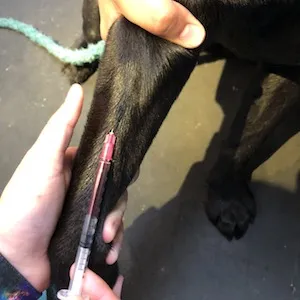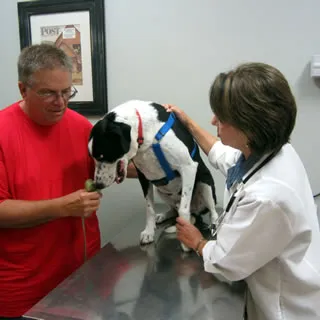Heartworm disease is a grave and potentially life-threatening condition for dogs worldwide, posing a significant threat to their heart, lungs, and overall health. Caused by foot-long worms residing in critical organs, this disease can lead to severe lung issues, heart failure, and damage to other vital bodily systems. As natural hosts for heartworms, dogs can harbor hundreds of these parasites, which, if left untreated, cause lasting harm. The good news is that effective Heartworm Medicine For Dogs is available for both prevention and treatment, offering a crucial shield against this insidious threat. Understanding how these medications work, when they’re needed, and the importance of veterinary guidance is paramount for every dog owner. Proactive prevention through consistent heartworm medicine administration is undeniably the best strategy, safeguarding your canine companion’s well-being and quality of life. Learn more about effective heartworm prevention medicine.
What is Heartworm Disease in Dogs?
Heartworm disease is caused by Dirofilaria immitis, a parasitic roundworm that infects dogs and other mammals. Dogs are considered natural hosts, meaning that heartworms mature into adults, mate, and produce offspring within their bodies. These worms primarily reside in the pulmonary arteries and the right side of the heart, where they can grow to be up to a foot long. The presence of these worms leads to severe inflammation, obstruction of blood flow, and progressive damage to the heart, lungs, and associated blood vessels. The long-term consequences can severely compromise a dog’s health and reduce their quality of life, even long after the parasites are gone.
 Foot-long heartworms in a dog's heart, highlighting severe internal damage
Foot-long heartworms in a dog's heart, highlighting severe internal damage
Unlike dogs, cats are atypical hosts, meaning heartworms often don’t reach full maturity, and the infection may not be as severe in terms of worm count. However, even immature worms in cats can cause a serious condition called heartworm associated respiratory disease (HARD). Ferrets, like dogs, are highly susceptible and can suffer devastating effects from even a single worm due to their small heart size. It’s crucial to understand these distinctions because heartworm medicine for dogs used for treatment is not safe for cats or ferrets, underscoring the universal importance of prevention.
How Heartworms are Transmitted to Your Dog
The transmission of heartworm disease is solely dependent on mosquitoes. It’s a multi-stage life cycle involving both an infected animal and a mosquito acting as an intermediate host. Here’s how it works:
- Microfilariae Production: Adult female heartworms living inside an infected dog (or wild animals like foxes and coyotes) produce microscopic baby worms called microfilariae. These microfilariae circulate in the infected animal’s bloodstream.
- Mosquito Infection: When a mosquito bites an infected animal, it ingests these microfilariae along with the blood meal.
- Larval Development in Mosquito: Inside the mosquito, the microfilariae develop into “infective stage” larvae over 10 to 14 days, depending on environmental conditions like temperature.
- Transmission to New Host: When this infected mosquito bites another dog, cat, or susceptible wild animal, the infective larvae are deposited onto the surface of the new host’s skin. They then enter the new host’s body through the mosquito’s bite wound.
- Maturation in Dog: Once inside the new host, it takes approximately six months for these larvae to develop into sexually mature adult heartworms. These adult worms can then live for 5 to 7 years in dogs, continuing the cycle by producing new microfilariae.
Due to the longevity of adult heartworms and the continuous cycle, each mosquito season can lead to an accumulation of worms in an unprotected pet. This highlights why consistent and year-round heartworm medicine for dogs is essential for prevention.
Recognizing Heartworm Symptoms in Your Dog
In the early stages of heartworm disease, many dogs show few or no noticeable symptoms. The longer the infection persists and the more worms accumulate, the more likely clinical signs will develop. Active dogs, those heavily infected, or dogs with pre-existing health issues often exhibit more pronounced symptoms.
Common signs of heartworm disease in dogs may include:
- A mild, persistent cough: Often described as a “soft, dry cough.”
- Reluctance to exercise: Your dog may tire more easily or show less interest in activities they once enjoyed.
- Fatigue after moderate activity: Even short walks can leave them breathless and exhausted.
- Decreased appetite and weight loss: As the disease progresses, it can affect their overall health and metabolism.
As heartworm disease advances, more severe symptoms can emerge:
- Heart failure: This can lead to the appearance of a swollen belly due to excess fluid accumulation in the abdomen (ascites).
- Caval Syndrome: A life-threatening form of cardiovascular collapse that occurs when a large number of heartworms cause a sudden blockage of blood flow within the heart. Symptoms include sudden onset of labored breathing, pale gums, and dark, bloody, or coffee-colored urine. Without immediate surgical removal of the heartworm blockage, the prognosis for caval syndrome is extremely poor.
Early detection through regular testing and prompt administration of heartworm medicine for dogs is critical to prevent these severe and potentially fatal outcomes.
The Importance of Heartworm Testing for Dogs
Heartworm disease is a serious and progressive condition, and early detection significantly improves the chances of a successful recovery. Since early stages often present with no visible symptoms, regular heartworm testing by a veterinarian is crucial for all dogs.
The heartworm test is a simple procedure that requires only a small blood sample from your dog. This test detects the presence of heartworm proteins (antigens) produced by adult female heartworms. Some veterinary clinics can process these tests in-house, while others send samples to diagnostic laboratories, but results are typically obtained quickly. If your dog tests positive, your veterinarian will likely recommend further diagnostic tests, such as X-rays or ultrasounds, to assess the severity of the infection and any damage to the heart and lungs.
When should your dog be tested?
The American Heartworm Society (AHS) recommends annual heartworm testing for all dogs, even those on year-round prevention.
- Puppies under 7 months of age: Can often start heartworm medicine for dogs without an initial test, as it takes at least six months for a dog to test positive after infection. However, they should be tested 6 months after the initial visit, again 6 months later, and annually thereafter.
- Adult dogs (over 7 months) not previously on prevention: Must be tested before starting heartworm prevention. They should also be retested 6 months and 12 months later, then annually.
- Dogs who have missed doses: If you’ve missed two or more doses of monthly prevention, consult your veterinarian immediately. They will likely recommend restarting the preventive and retesting your dog 6 months later. This retesting period is essential because heartworms must be approximately 7 months old before the infection can be reliably diagnosed by antigen tests.
 Veterinary technician drawing a blood sample from a dog for heartworm testing
Veterinary technician drawing a blood sample from a dog for heartworm testing
Annual testing, even for dogs on year-round prevention, serves as a vital safeguard. While heartworm medicine for dogs used as preventives are highly effective, they are not 100% foolproof. Missed doses, late administration, your dog spitting out a pill, or topical medication rubbing off can leave your dog vulnerable to infection. Without regular testing, an infection could go unnoticed, allowing adult worms to cause significant damage before symptoms appear.
Understanding Heartworm Prevention Medicine for Dogs
Heartworm prevention is by far the safest, most effective, and most economical approach to protecting your dog from this serious disease. Various forms of heartworm medicine for dogs are available, each designed to fit different dog owner preferences and needs.
Types of Heartworm Preventives
Heartworm preventives come in several forms:
- Oral Medications: Typically given monthly as chewable tablets or pills. These are widely popular and effective.
- Topical Medications: Applied monthly to the dog’s skin, usually between the shoulder blades. These are absorbed through the skin.
- Injectable Medications: Administered by a veterinarian every 6 or 12 months. This option ensures consistent protection without the owner having to remember monthly doses.
How Heartworm Preventives Work
All FDA-approved heartworm medicine for dogs works by eliminating the immature (larval) stages of the heartworm parasite that were transmitted by mosquitoes in the previous 30-45 days. This means the preventive kills the larvae before they can mature into adult worms, which are much harder to treat. It’s crucial to administer preventives strictly on schedule because heartworm larvae can develop into a juvenile/immature adult stage in as little as 51 days, a stage that current preventives cannot effectively eliminate. Late administration significantly increases the risk of infection.
Year-Round Prevention: Why it’s Crucial
The American Heartworm Society (AHS) strongly recommends year-round heartworm prevention for all dogs, regardless of location or climate. Here’s why:
- Unpredictable Risk: Heartworm disease has been diagnosed in all 50 U.S. states. Factors like climate variations, the presence of wildlife carriers (coyotes, foxes), and even mosquitoes being blown long distances or overwintering indoors make risk assessment difficult.
- Hidden Carriers: Stray and neglected dogs, as well as wildlife, act as reservoirs, contributing to the spread.
- Travel: If you travel with your dog, they could be exposed in higher-risk areas.
- Multi-Parasite Protection: Many modern heartworm medicine for dogs also offer protection against other common internal parasites like hookworms, roundworms, and whipworms. Some products even guard against external parasites such as fleas and ticks. These comprehensive products offer broader protection for your pet’s overall health. For instance, you might want to consider the best flea and tick medicine for huskies to protect larger breeds, or a specific flea and tick treatment for small dogs for smaller companions, which often come integrated with heartworm prevention.
 A dog sitting calmly on an examination table with a veterinarian, emphasizing regular check-ups
A dog sitting calmly on an examination table with a veterinarian, emphasizing regular check-ups
Combination Preventives
Many heartworm preventives are formulated to protect against a range of parasites, not just heartworms. These combination products can be highly beneficial, simplifying your pet’s parasite control regimen. Depending on the product, they may target:
- Intestinal Parasites: Hookworms, roundworms, whipworms, and sometimes tapeworms.
- External Parasites: Fleas, ticks, and certain mites (e.g., ear mites, scabies mites).
It’s important to discuss with your veterinarian which combination product is best suited for your dog, considering their lifestyle, geographical location, and specific parasite risks. No single product protects against all parasites, so a tailored approach is always recommended.
What to Expect When Your Dog Tests Positive: Heartworm Treatment
Receiving a positive heartworm diagnosis for your dog can be distressing, but the encouraging news is that most infected dogs can be successfully treated. The primary goals of heartworm treatment are to stabilize your dog’s condition if symptoms are present, eliminate all adult and immature worms, and minimize potential side effects.
Here’s a breakdown of what to expect if your dog tests positive:
Confirming the Diagnosis
Once an initial antigen test yields a positive result, your veterinarian will typically recommend a confirmatory test, often a different type of antigen test. This step is crucial because heartworm treatment is both expensive and complex, and your vet will want absolute certainty before proceeding. Additional diagnostics like blood work, chest X-rays, and possibly an ultrasound may be performed to assess the severity of the disease and determine your dog’s overall health status.
Exercise Restriction: A Critical Step
One of the most vital aspects of heartworm treatment is strict exercise restriction. As soon as the diagnosis is confirmed, your dog’s physical activity must be severely limited. Increased physical exertion elevates the heart rate and blood pressure, which can worsen the damage caused by the heartworms in the heart and lungs. Dead or dying worms can also break apart and travel to the lungs, causing blockages and severe inflammation. The more severe your dog’s symptoms, the less activity they should have, often requiring strict crate rest for several weeks or months.
Stabilizing Your Dog’s Health
Before the actual heartworm treatment can begin, your veterinarian may need to stabilize your dog’s condition with appropriate therapies, especially if they are showing severe symptoms or have other concurrent health issues. This pre-treatment phase can sometimes take several months and may involve medications to manage heart failure, lung inflammation, or other complications.
Administering Melarsomine: The Approved Treatment
The only drug approved by the U.S. Food and Drug Administration (FDA) for treating adult heartworm infection in dogs is melarsomine dihydrochloride. This powerful medication is administered via injection, typically deep into the muscle, and must be given in a veterinary hospital setting under strict supervision. The American Heartworm Society (AHS) provides detailed guidelines for melarsomine treatment protocols, which usually involve a series of injections.
- Standard Protocol: Often includes a single initial injection followed by two more injections 30 days later. This phased approach helps to reduce the risk of complications by allowing the body to gradually process the dying worms.
- Associated Risks: While melarsomine is highly effective, there are risks involved. The most common complications arise from the dying worms lodging in the pulmonary arteries, which can cause severe inflammation and blood clots. This is why strict exercise restriction during and after treatment is absolutely paramount. Your vet may also prescribe other medications, such as corticosteroids to reduce inflammation or antibiotics (like doxycycline) to eliminate bacteria (Wolbachia) that live within heartworms, which can contribute to inflammatory responses.
Dogs with mild or no symptoms generally have a high success rate with treatment. Even those with more severe disease can be successfully treated, though the possibility of complications may be higher.
 A dog resting comfortably in a veterinary kennel after heartworm treatment, emphasizing recovery
A dog resting comfortably in a veterinary kennel after heartworm treatment, emphasizing recovery
Post-Treatment Monitoring and Continued Prevention
Approximately 9 months after the completion of melarsomine treatment, your veterinarian will perform a follow-up heartworm test to confirm that all adult heartworms have been eliminated. In some cases, it can take longer for the heartworm antigen to clear completely, or a second course of treatment may be required if adult worms are still detected.
Crucially, to prevent reinfection, your dog must be maintained on year-round heartworm medicine for dogs for the remainder of their life. Starting prevention during the treatment process is also often recommended, ensuring no new infections develop while the existing ones are being eliminated, and helping to prevent your dog from being a source of microfilariae for mosquitoes.
 Detailed illustration of heartworms intertwined in a dog's heart, showing the severity of infection
Detailed illustration of heartworms intertwined in a dog's heart, showing the severity of infection
The Veterinarian’s Role in Prescribing Heartworm Medicine for Dogs
Your veterinarian is your most valuable partner in protecting your dog from heartworm disease. Their expertise is essential for both prevention and treatment.
Prescription Requirement
All FDA-approved heartworm medicine for dogs requires a prescription from a licensed veterinarian. This is a critical safety measure. Before prescribing a preventive, your veterinarian will conduct a heartworm test to ensure your dog isn’t already infected with adult heartworms. Giving preventives to a dog with adult heartworms can lead to rare but potentially severe and even fatal reactions. For very young puppies (under 7 months), a test may not be necessary initially, as it takes approximately six months for heartworms to mature enough to be detected by current tests.
Dosage and Weight Management
Heartworm medication dosages are precisely calculated based on your dog’s body weight. This is particularly important for growing puppies, whose weight can change rapidly. Regular weigh-ins at veterinary visits are crucial to ensure your dog is receiving the correct dosage. If your puppy gains enough weight to move into a higher dosage range, an inadequate dose could leave them unprotected. Your vet can advise you on anticipating dosage changes.
What if a Dose is Missed?
If you miss a dose of your dog’s monthly heartworm preventive, contact your veterinarian immediately. They will advise you on the best course of action, which usually involves restarting the medication and retesting your dog approximately 6 months later. This retest is vital to detect any potential infection that might have occurred during the unprotected period.
Importance of Regular Check-ups
Beyond heartworm prevention, regular veterinary check-ups are essential for your dog’s overall health. During these visits, your vet can address a wide range of health concerns, from dental care to common ailments. For example, they can diagnose and recommend ear infection meds for dogs if your dog develops an ear issue, or discuss tick removal medicine for dogs if you’re concerned about external parasites. These routine visits allow for early detection and treatment of various conditions, contributing to your dog’s long and healthy life.
 A veterinarian gently examining a dog's teeth during a routine health check-up
A veterinarian gently examining a dog's teeth during a routine health check-up
Addressing Common Concerns About Heartworm Medicine
Pet owners frequently have questions regarding heartworm prevention and treatment. Here are answers to some common concerns:
Is There a Vaccine for Heartworm Disease?
No. Currently, there is no commercially available vaccine to prevent heartworm disease in dogs or cats. Prevention relies solely on the regular and appropriate use of prescription preventive medications, such as monthly chewables, topical applications, or semi-annual/annual injections. Research into a vaccine is ongoing, but for now, medication is the only proven method.
Is There an Effective Natural Prevention for Heartworm?
No. Only heartworm prevention products that have been thoroughly tested and proven effective and safe by regulatory bodies like the U.S. Food and Drug Administration (FDA) should be used. There is no scientific evidence to support the efficacy of “natural” or alternative remedies for preventing heartworm infection. Relying on unproven methods can leave your dog vulnerable to a potentially fatal disease.
What Causes a Dog to Die from Heartworm Disease?
Heartworm disease is complex and can impact multiple vital organs, including the heart, lungs, kidneys, and liver. Adult worms cause inflammation of blood vessels, leading to blockages (pulmonary thrombosis) and heart failure. The sheer size of these worms (up to a foot long) means the damage can be extensive. Liver or kidney failure can also occur. Dogs exposed to a large number of infective larvae simultaneously face a high risk of sudden death due to massive numbers of developing larvae overwhelming the vascular system. Even dogs with fewer worms may live a long time without symptoms, but an environmental stressor or another health issue can suddenly exacerbate the condition.
Can I Still Use Expired Heartworm Medication?
No. As with all pharmaceutical products, heartworm medicine for dogs should always be used before its expiration date. The expiration date is established through rigorous testing mandated by the FDA to guarantee the product’s effectiveness and safety over time. Using expired medication means there’s no assurance it will be effective in preventing heartworm infection, potentially leaving your dog unprotected.
Heartworm Risk Factors for Dogs: Beyond Your Local Area
Many factors influence your dog’s risk of heartworm infection, even if you perceive heartworms to be uncommon in your immediate vicinity.
- Widespread Incidence: Heartworm disease has been diagnosed in all 50 states of the U.S., making it a national concern.
- Geographical “Hot Spots”: Certain regions, particularly near the Atlantic and Gulf coasts, and along river tributaries, have a significantly higher incidence of heartworms. Even within states, there are “hot spots” where infection rates are much higher than in other areas.
- Environmental Factors: Climate (temperature, humidity), the specific species of mosquitoes present, and the availability of mosquito breeding grounds all contribute to the level of risk.
- Wildlife Carriers: Wild species such as coyotes, wolves, and foxes act as important carriers of the disease, and their proximity to urban areas means they can be a constant source of infection for local mosquito populations.
- Travel and Relocation: Traveling with your pet to areas where heartworms are more prevalent, or the relocation of infected pets, can contribute to the spread of the disease to previously uninfected regions.
- Indoor vs. Outdoor Risk: Because mosquitoes can easily find their way indoors, both outdoor and indoor pets are at risk of infection.
 Map showing the incidence of heartworm disease across the United States in 2019
Map showing the incidence of heartworm disease across the United States in 2019
The unpredictability of these factors, from year-to-year climate variations to the movement of wildlife, makes it impossible to accurately predict your dog’s individual risk without consistent prevention. This reinforces the American Heartworm Society’s “Think 12” recommendation: get your dog tested every 12 months for heartworm, and give your dog heartworm medicine for dogs year-round, 12 months a year.
Conclusion
Heartworm disease is a serious, progressive, and potentially fatal condition that can significantly impact your dog’s health and quality of life. As responsible pet owners, understanding the disease, its transmission, symptoms, and the critical role of heartworm medicine for dogs is essential. From year-round preventive medications that safeguard against infection to the complex, veterinarian-supervised treatments for infected dogs, every step taken aims to protect our canine companions.
The key takeaways are clear:
- Prevention is paramount: Consistent, year-round administration of veterinarian-prescribed heartworm medicine is the most effective and safest way to protect your dog.
- Annual testing is crucial: Even with prevention, regular testing ensures early detection and confirms the effectiveness of your prevention program.
- Veterinary guidance is indispensable: Your veterinarian is your trusted partner, providing accurate diagnoses, prescribing appropriate medications, and guiding you through prevention and treatment protocols.
Do not wait for symptoms to appear, as by then, significant damage may have already occurred. Talk to your veterinarian today to establish a comprehensive heartworm prevention plan tailored to your dog’s needs, and ensure they remain healthy and heartworm-free.
References
- American Heartworm Society. (Accessed various pages for information on heartworm disease, prevention, and treatment protocols for dogs, cats, and ferrets).
- U.S. Food and Drug Administration (FDA). (Referenced for approval and prescription requirements of heartworm medications).
